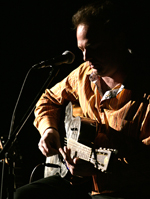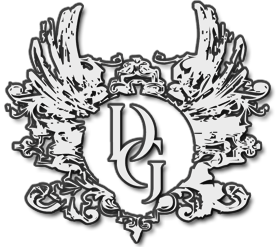Press
Wake Me Up Before You Gogo

ECHO Weekly -
Kitchener, ON
Vol. 10 No. 12 • December 14 -20 2006
By Shain Shapiro
 In
the realm of the blues, often an artist’s validation resides in the
external, like where the artist comes from, what colour their skin is and
what city they were brought up in. The blues does inherently refer to being
wrought in troubles, so if the artist has nothing to complain about, then
in traditional music circles, they have no right playing the blues. Yet,
in our ever-more post-modern world where no means yes, blues – like
all other steadfast musical genres – are being turned over on their
proverbial heads to see how many times they can spin without getting dizzy.
Upper middle class white kids from the suburbs are now playing the blues,
and playing it decidedly well, as the ancestral roots and influences of the
style and its beginnings are reaching further than the inner cities of Memphis,
Kansas City and Detroit. Hamilton, for example, has a burgeoning blues scene
feeding off the depressing reality of living the no-frills life, while similar
scenes are developing nationwide that cry foul about local, indigenous problems,
suburban or not. Another inconspicuous location is the far west, Nanaimo,
BC to be exact, the home of one of Canada’s best blues-smiths, David
Gogo.
In
the realm of the blues, often an artist’s validation resides in the
external, like where the artist comes from, what colour their skin is and
what city they were brought up in. The blues does inherently refer to being
wrought in troubles, so if the artist has nothing to complain about, then
in traditional music circles, they have no right playing the blues. Yet,
in our ever-more post-modern world where no means yes, blues – like
all other steadfast musical genres – are being turned over on their
proverbial heads to see how many times they can spin without getting dizzy.
Upper middle class white kids from the suburbs are now playing the blues,
and playing it decidedly well, as the ancestral roots and influences of the
style and its beginnings are reaching further than the inner cities of Memphis,
Kansas City and Detroit. Hamilton, for example, has a burgeoning blues scene
feeding off the depressing reality of living the no-frills life, while similar
scenes are developing nationwide that cry foul about local, indigenous problems,
suburban or not. Another inconspicuous location is the far west, Nanaimo,
BC to be exact, the home of one of Canada’s best blues-smiths, David
Gogo.
At first glance, David Gogo does not look like an epochal blues guitarist. Like most first glances, deceit is afoot, as he is in fact one of Canada’s most electrifying blues exports. Gogo has been gigging since the early 1980s, and has built up an impressive resume in the process, including supporting B.B. King, Albert Collins, George Thorogood, Tragically Hip and Little Feat. In addition to his superb live work, Gogo has laid down incisively emotive guitar licks and sweaty solos to eleven studio projects, from an ongoing bootleg series of live albums to is most recent project, a solo affair simplistically entitled Acoustic that he recorded primarily alone, at home in British Columbia. “I thought that recording at home was a nice idea,” responds Gogo. “It was supposed to be an in-between project while the band was taking some time off, and I am no technical wiz, so the gear I used was decisively not modern. Yet, once I heard the playbacks, I fell in love with its old time sounding record. The fact that is was at home adds to that atmosphere.”
A combination of originals and cover versions, Acoustic offers the most personal, introspective look at Gogo’s personality, aside from and influenced by the blues. The soul of the downtrodden permeate each passing melody, from storybook songs written about a mining accident in 1915 that killed his great-grandfather to a stripped-down cover tune meant as an epitaph to a failing relationship. In addition, “Dust My Broom,” a song Gogo refers to as “older than water” was recorded on per request of a fan whilst “It’s Killing Me” hints at the tumultuous time Gogo was experiencing amidst his solitary recording sessions. “This record was made during a difficult point in my life, as I was going through a break-up while on tour and still trying to creative,” explains Gogo. “While the last record I did, Vibe was all originals, I felt returning to the vault of covers for a few was warranted this time around. For example, I went to the Stax museum in Memphis a while back, and seeing it made me realize how much the label influences me, that sound. So I decided to cover Otis Redding’s ‘That’s How Strong My Love Is’ as the last song on the record to symbolize my life – and my personal relationships – at that point.”
Acoustic, in its most fragile, quiescent moments, emotes the truest nature of the blues. While Gogo does not technically fit the profile, his music hits the key emotions bang on, because he writes about his blues, his life and his experiences as a Canadian entrenched in the soul of the blues. Rather than emit one Muddy Waters or Howlin’ Wolf rendition after another, Gogo writes about family tragedy and broken love, both core symbols entrenched in the blues from Mississippi to Nanaimo. “As I become older, I have become more interested in my stories and consequently, I like writing about more personal themes. I am trying to develop my art and become a better writer and musician and part of that is keenly observing and trying to see the bigger picture, and looking back into my history validates the my blues, personally,” affirms Gogo.
With the release of Acoustic, Gogo has ventured off on the road alone for the first time ever, performing with two ancient guitars and a beat-up microphone. Joining him throughout the Ontario leg will be Kelly Hopper on harmonica, formerly of Big Sugar, but that’s all. Like the album, the show is a story, a campfire get together focused on truly fleshing out the meat of the blues, rather than drenching the coals in too many rhythms, melodies and arrangements. “In no way what I’m doing is me without the band, as these shows do not feature the same songs. I only do to or three songs acoustic that I will do with my band. I still get to blast on the guitar really hard, but in a more subdued, relaxed atmosphere,” responds Gogo. “This is a return to old blues, but my way, without being stuck-up about it.” David Gogo is all over Ontario in the next few weeks. Visit www.davidgogo.org for more info.
David Gogo
Friday, Dec. 8
@ the Boathouse,
57 Jubilee Dr., Kitchener
745-7202
www.davidgogo.org
© 2006 www.echoweekly.com


